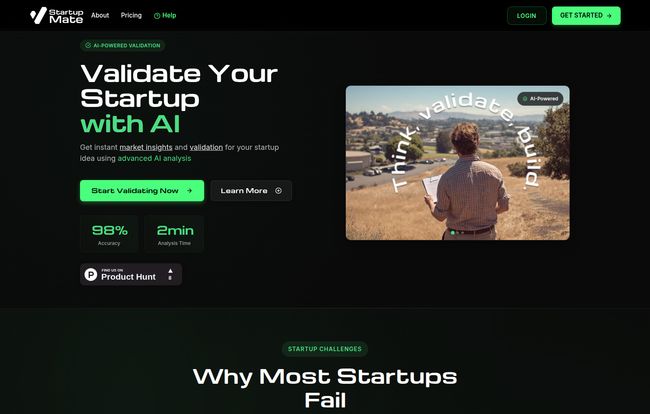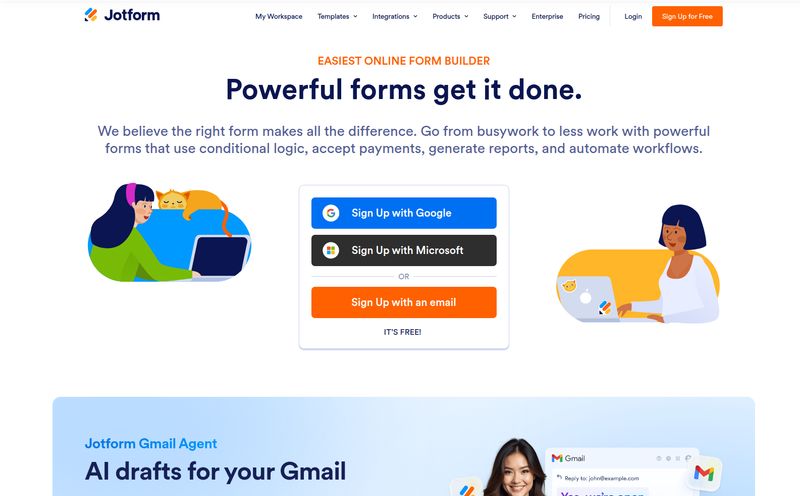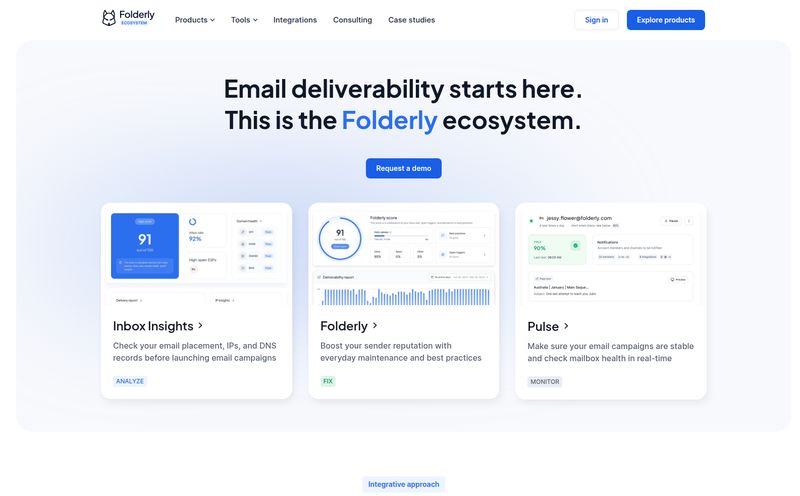Every single one of us in the startup or digital marketing world has had it. That late-night, caffeine-fueled “aha!” moment. The idea that feels so brilliant, so revolutionary, you start mentally designing the logo and practicing your TechCrunch interview. I’ve been there. I once spent a whole weekend mapping out a hyper-local, artisanal coffee bean delivery service via drones. It sounded incredible in my head. In reality? A logistical nightmare that the market probably didn't even want.
That’s the terrifying part, isn’t it? The gap between a brilliant idea and a viable business. We’ve all seen the grim statistics. The ones that get thrown around in every VC pitch deck and entrepreneurial blog post. The image I was just looking at from StartupMate’s site puts it bluntly: 75% of startups fail due to premature scaling. A whopping 58% simply lack guidance. But the real gut-punch for me has always been the 34% that fail because of ‘no market fit’. Thirty. Four. Percent. That’s more than a third of passionate, hard-working founders building something nobody was willing to pay for. Ouch.
For years, the only cure was “getting out of the building”—pounding the pavement, running surveys, and spending months (and a small fortune) on market research. But now, AI is barging into the party. And tools like StartupMate are promising a different way. A faster, data-backed sanity check before you mortgage your house. But is it any good? Let’s find out.
The Sobering Reality of Startup Failure
Before we get into the tech, let's just sit with that failure rate for a moment. It's not just a number. It's dreams deferred. It's savings accounts drained. It's the emotional rollercoaster of pouring your soul into a project only to watch it fizzle out. The fear of wasting time, the nagging feeling of not being an ‘expert’, the sheer terror of public failure—these are the silent co-founders in almost every new venture.
The traditional path to validation is, frankly, arduous. You try to analyze competitors, but you’re probably biased. You survey potential customers, but they often tell you what you want to hear (“Oh yeah, I’d totally use that!”). It’s a messy, imperfect process that can feel like trying to find your way out of a forest with a hand-drawn map. StartupMate claims to be the GPS.
So, What in the World is StartupMate?
In simple terms, StartupMate is an AI-powered platform designed to be your first, brutally honest investor. You feed it your startup idea, and its algorithm goes to work, analyzing it against a mountain of data. Think of it less as a magic 8-ball and more as an incredibly fast, unbiased market research analyst who has chugged a gallon of coffee.
It’s built to tackle those three core fears head-on:
- Fear of Wasting Time: It gives you a rapid assessment, so you don't spend six months building a product for a non-existent market.
- Lack of Expertise: It provides market analysis and competitive insights that would normally require years of experience or expensive consultants.
- Fear of Failure: By identifying potential risks early, it helps you pivot or kill an idea before it kills your morale and your bank account.
The whole point is to give you a data-driven foundation, a real-world check that moves your concept from “cool idea” to “potentially investable venture.”

Visit StartupMate
A Peek Under the Hood: The Core Features
Okay, so it sounds neat. But what does it actually do? I dug into its main components, and here's the breakdown of what seems to be the most valuable.
AI-Powered Idea Validation
This is the main event. You input your concept, and the AI crunches the numbers. It's looking for patterns, potential pitfalls, and market viability. It’s not just a yes/no verdict. It's designed to give you a detailed report on the strengths and weaknesses of your idea, based on whatever data models it's been trained on. It’s like having a co-founder who isn't afraid to tell you your baby is ugly.
Deep Market and Competition Analysis
For me, as an SEO and traffic guy, this is gold. Manually analyzing a market and its key players is a time-sink. You're digging through SERPs, stalking social media, and trying to reverse-engineer competitor strategies. StartupMate automates a huge chunk of this. It identifies direct and indirect competitors, analyzes their positioning, and helps you see where you might fit in—or if the space is just too crowded. This is the kind of stuff that can save you weeks of grunt work.
Comprehensive Risk Assessment
This goes beyond simple market fit. The platform claims to assess different types of risks: technical feasibility (can this even be built?), operational complexity (what would it take to run this day-to-day?), and financial hurdles. Spotting these red flags early is, without a doubt, a massive advantage.
The Million-Dollar Question: What's the Price?
Alright, let's talk turkey. Great tools are only great if you can afford them. StartupMate has a pretty straightforward pricing structure that seems designed to scale with you. It's not one of those “contact us for a demo and prepare your wallet” situations, which I appreciate.
| Plan | Price | Best For |
|---|---|---|
| Trial | Free | The curious founder with a single idea they want to test. It’s limited but gives you a taste. |
| Starter | $9 / month | The serial ideator or early-stage entrepreneur who needs to validate a few concepts without breaking the bank. |
| Premium | $19 / month | Small teams or founders who are getting serious and need to share reports with potential partners or investors. |
| Enterprise | Custom | Incubators, accelerators, VCs, and larger organizations vetting a high volume of ideas. |
Honestly, the entry points are very reasonable. For less than a couple of fancy coffees a month, the Starter plan could save you thousands. That’s a pretty compelling value proposition.
The Good, The Bad, and The AI
No tool is perfect. Let’s weigh the pros and cons from my perspective.
What I Genuinely Like
The biggest pro is the forced objectivity. It removes your own confirmation bias from the equation. The data-driven approach is a powerful antidote to wishful thinking. As founder Michael T. says in a testimonial on their site, “The Premium plan has been invaluable for us. We were able to generate investor-grade reports for potential investors, which really streamlined our fundraising efforts.” That’s a huge win—it’s not just an idea tool, but a fundraising tool.
Plus, the sheer time and cost savings are undeniable. What it does in minutes could take a small team weeks of manual research. It empowers solo founders and small teams to punch above their wieght class.
Potential Downsides to Consider
Let's be real, it's still an algorithm. AI is fantastic at spotting patterns in data, but it can miss human nuance. It won't understand a burgeoning cultural shift or a niche community's deep-seated-problem the way an empathetic human can. It’s a powerful guide, not a gospel.
Then there's the trust factor. You have to be willing to input your precious “secret” idea into a third-party platform. They have a privacy policy and state that ideas are safe, but for some founders, that will always be a hurdle. Lastly, some of the best features, like team management and shareable reports, are locked behind the Premium plan. That's standard for SaaS, but something to be aware of.
So, Is StartupMate Worth Your Time and Money?
After digging through it, my take is this: StartupMate is a powerful tool for a specific—and very large—group of people. If you are an aspiring entrepreneur, a student in a business program, a serial founder with a notebook full of ideas, or even an early-stage VC trying to quickly vet incoming pitches, then yes. It seems absolutely worth it.
It's an incredibly efficient way to de-risk your next move and build your business on a foundation of data, not just dreams. It won’t build the business for you, and it shouldn't be the only validation you do. You still need to talk to actual humans! But as a first step? As a way to filter out the non-starters from the potential unicorns? I’m genuinely impressed.
It's not about replacing human intuition, but augmenting it. It’s about having a data-informed conversation instead of just an emotional one. And in the brutal world of startups, that might be the most valuable co-founder you could ask for.
Frequently Asked Questions
Here are some quick answers to questions I saw on their site and a few I had myself.
How does StartupMate determine if an idea is market-ready?
It uses a combination of AI-driven market trend analysis, competitive landscape evaluation, and risk assessment models. It's looking for indicators of existing demand, a clear gap in the market, and a feasible path to launch.
Is my startup idea safe on the platform?
StartupMate states on their website, “Your Ideas Are Safe With Us” and points to their privacy policy. They claim that the analysis is automated and confidential. However, you should always review the latest privacy policy yourself before submitting sensitive information.
How accurate is the market size data?
According to their FAQ, they use real-time data analysis from a mix of sources to provide dynamic market sizing. It's likely more of a sophisticated estimation (TAM, SAM, SOM) than a perfect, granular number, but it’s intended to be a strong directional guide.
Can this tool replace talking to real customers?
Absolutely not. And I don’t think it’s meant to. This tool is for pre-validation and research. It helps you form a strong hypothesis. You should still take that hypothesis and test it with real, potential customers. This tool helps ensure you're asking the right people the right questions.
Who benefits most from the Premium plan?
The Premium plan seems ideal for founders who are ready to approach investors or partners. The ability to generate and share investor-grade reports, plus the team management features, are clearly aimed at ventures that are moving from the idea phase into the operational/fundraising stage.



